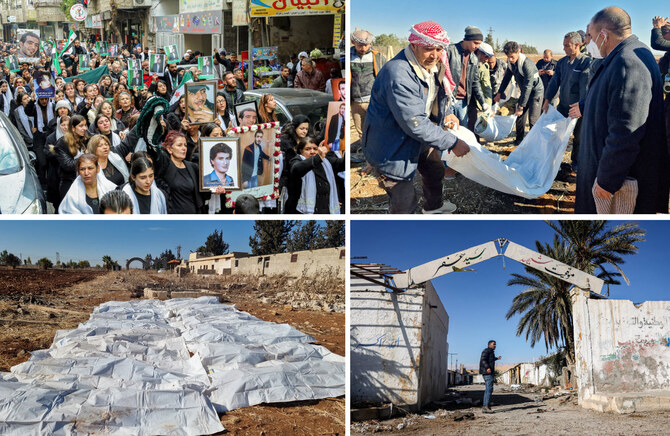LONDON: While thousands across the Syrian Arab Republic celebrated the fall of Bashar Assad on Dec. 8, others were fearful of the retribution they would likely face for their ties to the ousted regime. For many, those fears are quickly realized.
The Syrian people endured immense suffering over the course of the nation’s 13-year civil war, with countless killed, displaced, or disappeared by the regime and its militia allies, fueling impatient calls for justice.

As a result, areas of rural Homs and the Mediterranean coast with high densities of Alawites — the ethno-religious group from which the Assad family traced its roots and drew much of its support — have seen mounting instability.
Reports of sectarian killings began to emerge as the interim government carried out security sweeps, while armed men, reportedly seeking revenge against those they deemed responsible for the years of bloodshed, have taken the law into their own hands.
Karam Shaar, a senior fellow at the Newlines Institute for Strategy and Policy, believes the interim government in Damascus faces a significant challenge of balancing accountability with social cohesion and stability.
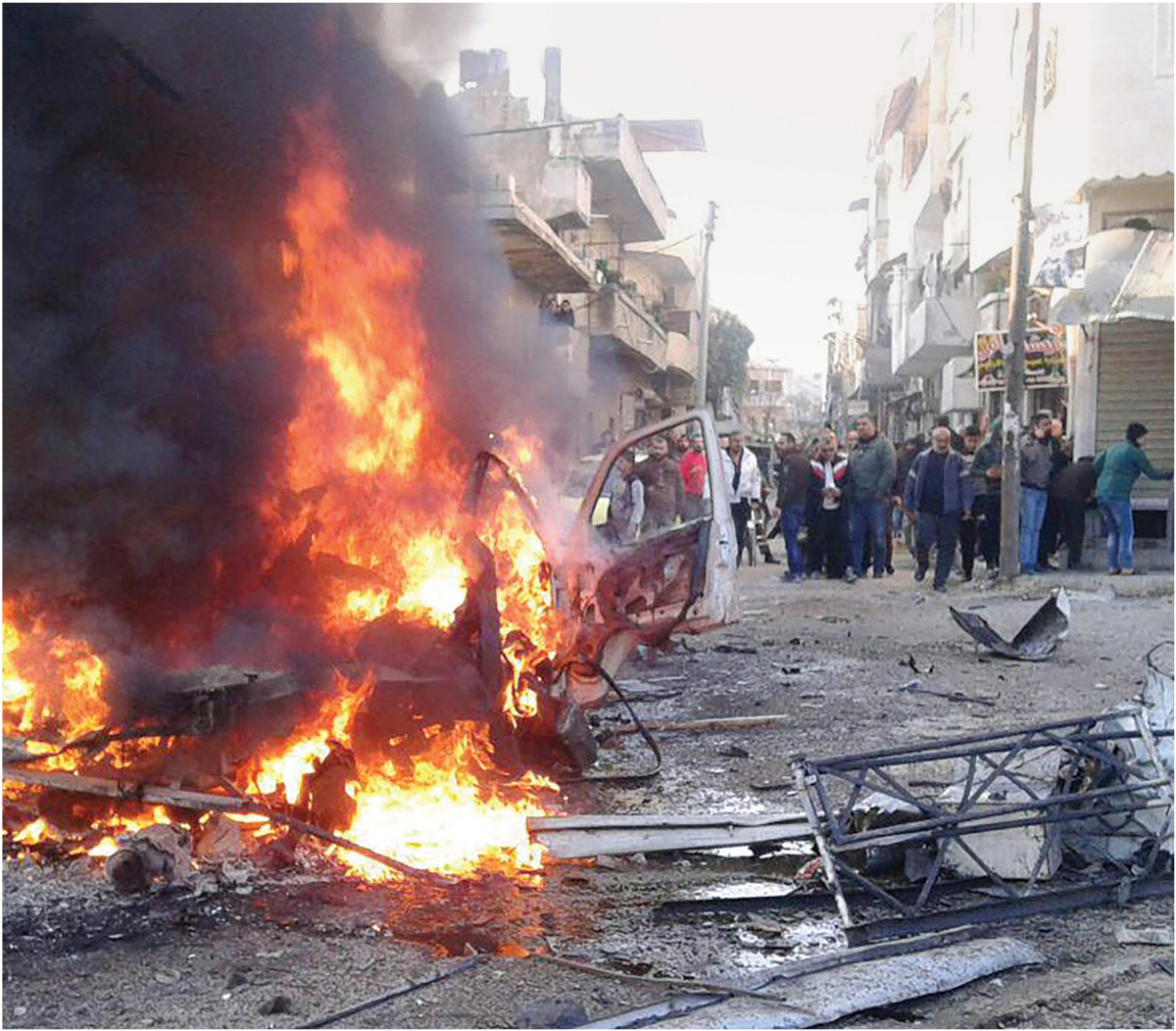
Surge in revenge attacks and criminality since Assad’s overthrow prompts call for transitional justice effort. (AFP)
The new leaders “fully understand that pursuing accountability head-on at this point, given the fragile security situation, could lead to a resurgence of extremist groups, paramilitary militias, and territorial factions,” Shaar told Arab News.
In early December, as rebel forces led by the militant group Hayat Tahrir Al-Sham advanced into Homs before going on to topple the Assad regime, tens of thousands of Alawites fled the central province to the Syrian coast, fearing reprisals.
Camille Otrakji, a Syrian-Canadian analyst, says the exodus of Alawites to their heartland on the Mediterranean coast “has led many to question whether this phase constitutes a low-intensity ethnic cleansing project aimed at relocating Alawites exclusively to the coastal region.”
“While Christians in Aleppo and Alawites in the coastal region of Syria are less frequently subjected to human rights abuses, those in central Syria (Homs and Hama governorates) are the ones who bear the brunt of the punishment,” Otrakji told Arab News.
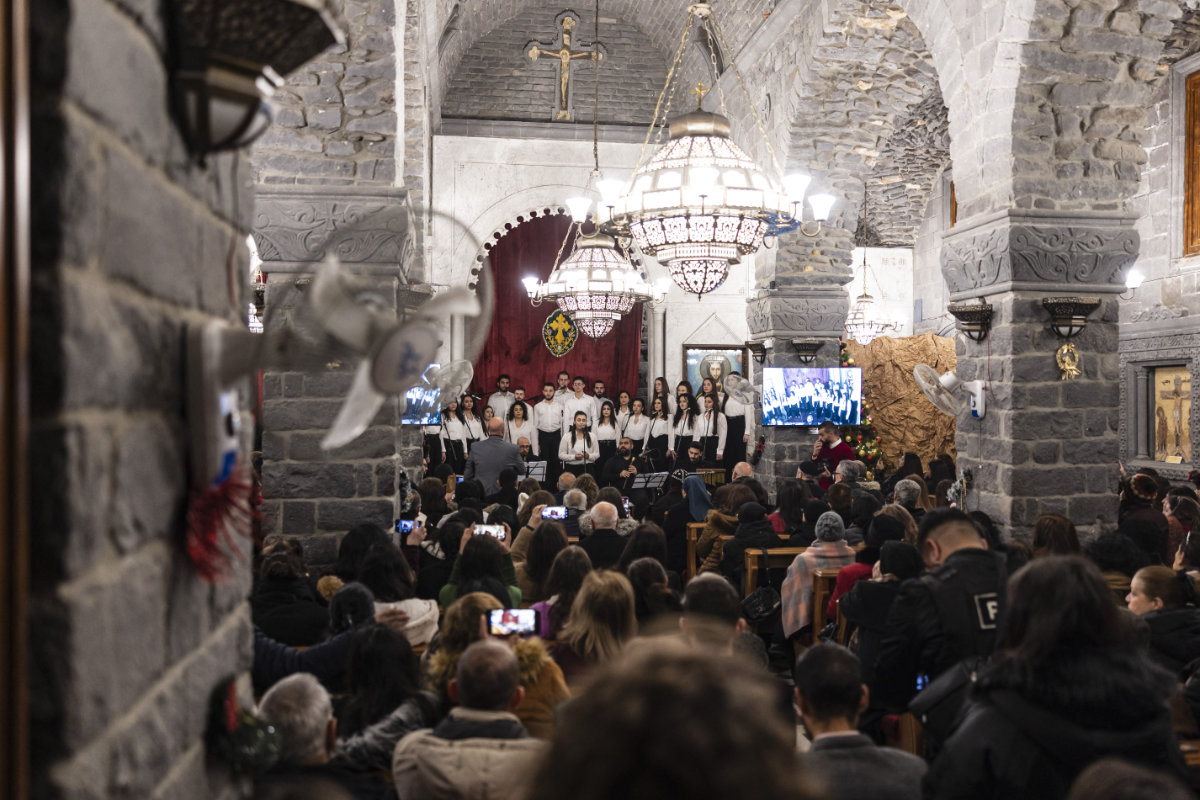
Syrian Christians attend mass at the Saint Mary Church of the Holy Belt in Homs on December 20, 2024. (AFP)
As fear of retribution and sectarian violence spread through the Alawite community and other ethnoreligious groups, Syrian President Ahmad Al-Sharaa pledged in late December that his administration would protect the country’s diverse sects and minority groups.
However, as of Feb. 7, the Syrian Observatory for Human Rights, a UK-based war monitor, has documented 128 retaliatory killings across 11 provinces since the start of 2025 alone — with Homs leading the toll, followed by Hama.
Alawites, a Muslim sect who constitute around 10 percent of Syria’s population, are at particular risk of collective punishment — including for those who opposed Assad.
During the 50-year rule of Bashar and his father Hafez, Alawites formed the backbone of the regime, with around 80 percent of them working for the state — many in intelligence, security, or the military, according to the Washington Institute.
After Assad’s ouster and the rebel coalition’s capture of Damascus in December, interim authorities moved to curb the spread of arms, urging former conscripts and soldiers to surrender their weapons.
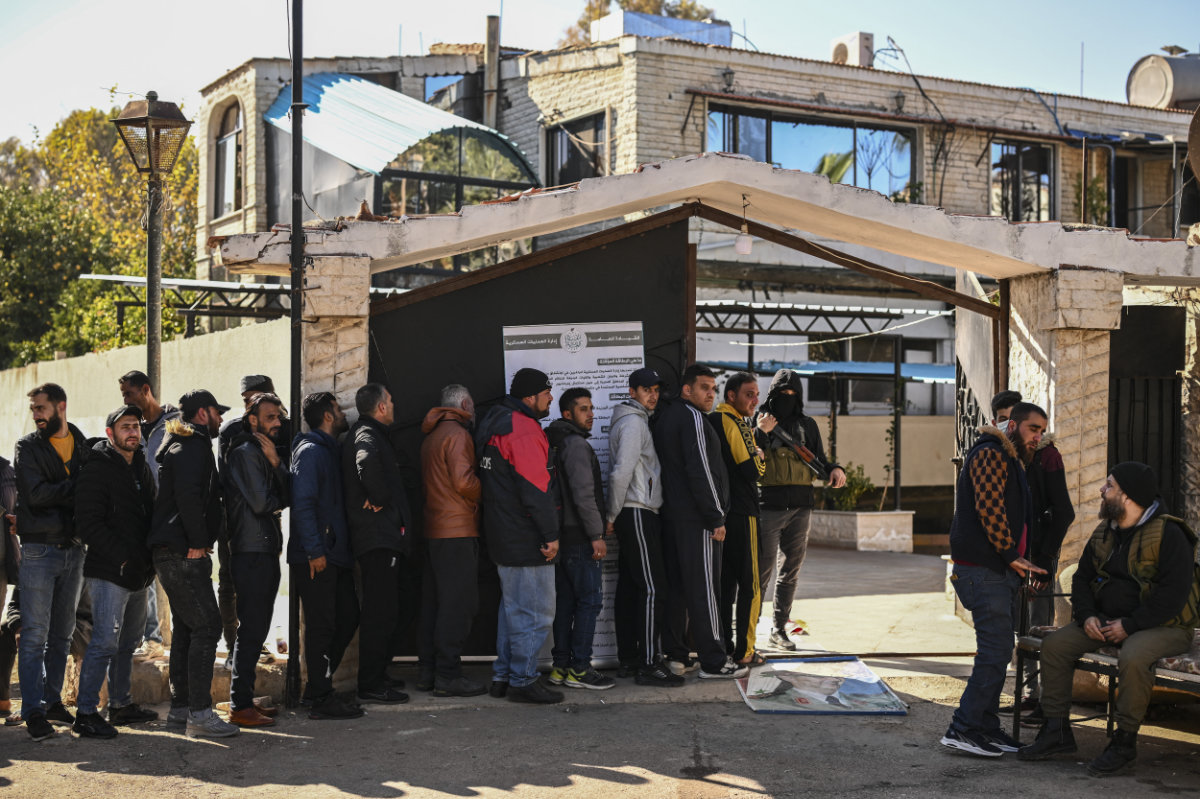
Soldiers and police officers of the fallen Assad regime line up on December 17, 2024, to register at a center in Daraa created by victorious opposition forces to settle their status and surrender their weapons. (AFP)
However, many have chosen to hold on to these weapons — in many cases for self defense. In response, security forces launched an operation in Homs in January to capture “remnants of Assad’s militias.”
The operation followed clashes in Alawite neighborhoods, sparked by an old video that resurfaced in December, showing rebels burning the shrine of the Alawite sect’s founder.
Quoting a security official, state news agency SANA said on Jan. 2 that the security campaign targeted “war criminals and those involved in crimes who refused to hand over their weapons.”
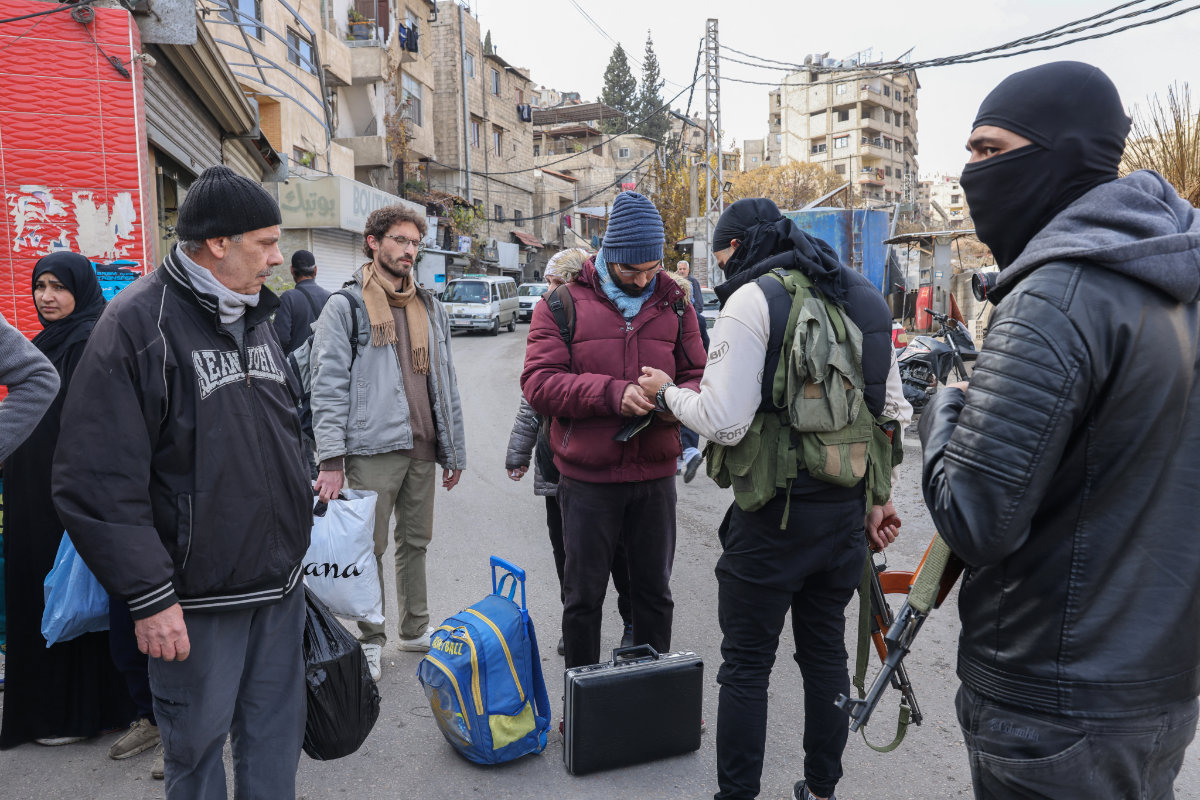
Fighters affiliated with Syria's new administration check people's identification at a makeshift checkpoint after closing a road leading to the Alawite-majority Mazzeh 86 neighbourhood in western Damascus on December 26, 2024. (AFP)
While security forces were conducting raids in rural Homs, members of the Alawite community shared videos on social media showing militants, reportedly linked to HTS, beating and abusing Alawites in Homs and in coastal areas while hurling sectarian insults.
The Syrian Observatory for Human Rights estimated that within a month of Assad’s ouster, at least 160 Alawites were killed in raids and sectarian attacks.
In a recent incident documented by the war monitor, “unidentified gunmen” opened fire on civilians at the Baniyas-Jabaleh junction in the coastal region, killing a former officer and a worker.
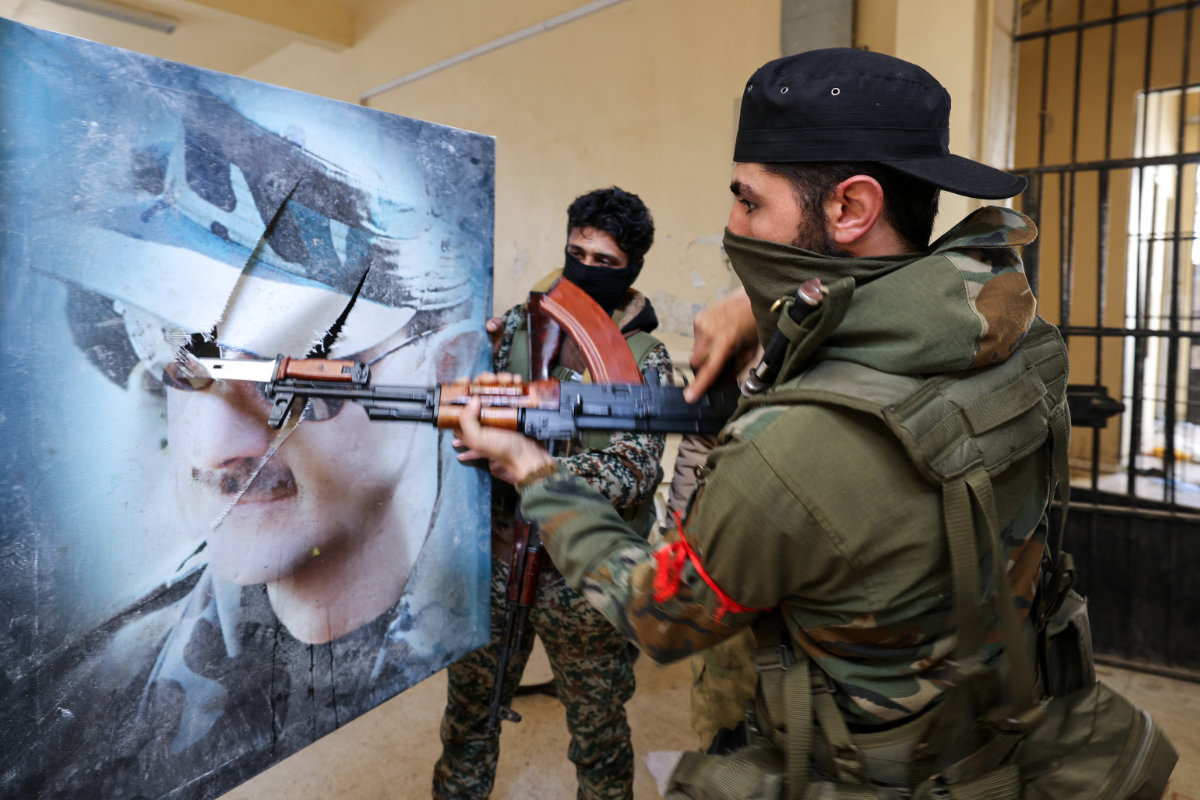
A fighter affiliated with Syria's new administration bayonets a portrait of toppled president Bashar al-Assad at the defunct Mezzeh military prison in Damascus on January 2, 2025. (AFP)
Similarly, in rural Homs, factions linked to the new administration reportedly raided the village of Al-Dabin, attacked a civilian home and killed a young man.
Joshua Landis, director of the Center for Middle East Studies at the University of Oklahoma, said that as social media and word of mouth spread reports of killings, robberies, and kidnappings, “lawlessness, particularly in the Alawite villages around Homs and Hama, is causing near hysteria within the community.”
“Many Alawites are demanding justice,” he told Arab News. “They understand that the Assad regime committed terrible atrocities, particularly in the prisons, but they fear that the wrong people are being killed in random attacks and revenge killings.”
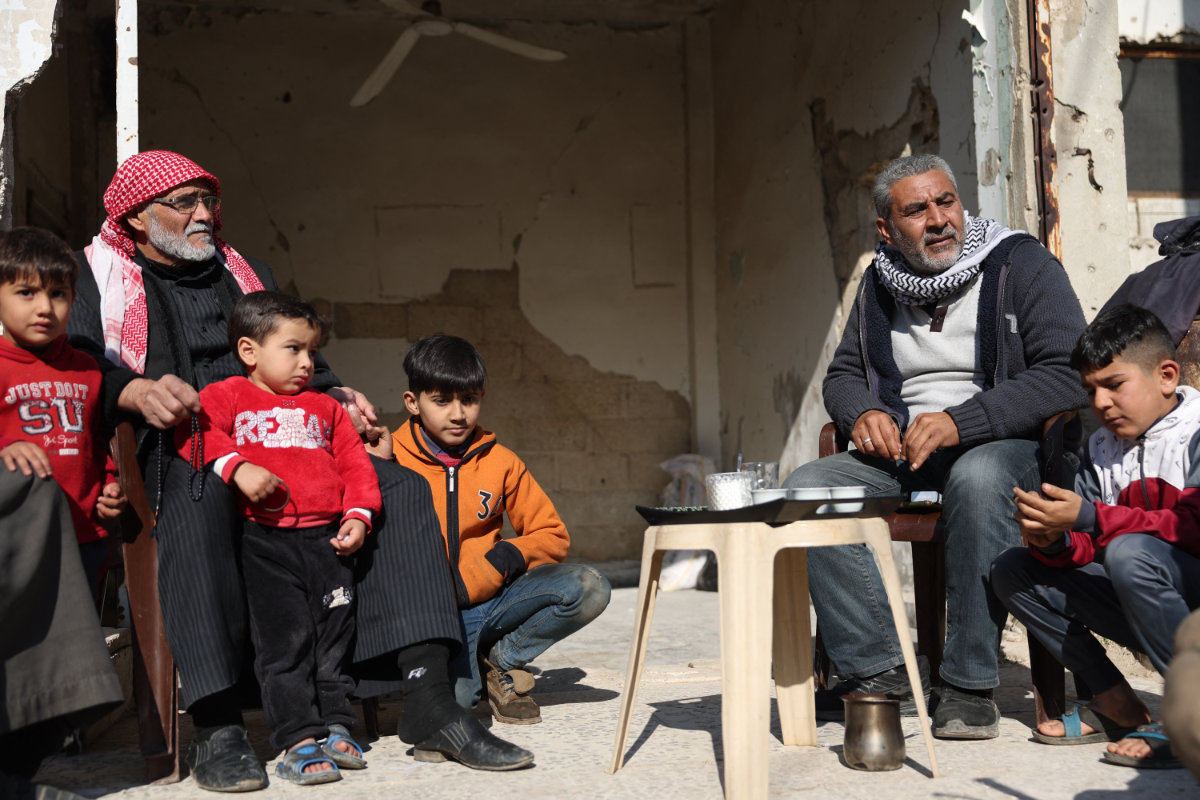
An Alawite Syrian, who had fled to Lebanon, sits with a neighbor and family members in front of his severely damaged home, after returning to the Baba Amr neighbourhood in Homs, on Jan. 8, 2025. (AFP)
He added: “One of the primary reasons for animosity toward the new government of President Al-Sharaa within the Alawite community is the lawlessness now overtaking the coastal region.”
Shaar of the New Lines Institute says the perceived delay in tackling this lawlessness might be due to the need to first establish the state’s monopoly on the use of force during this transitional period.
“I think the caretaker government is prioritizing stabilizing security, consolidating power, and establishing a monopoly on force, as any state should, before addressing these violations,” he said.
Referring to the new authorities, he added: “I still don’t see their vision, and maybe we shouldn’t expect one this early. Perhaps it does take time.
“In that sense, it’s understandable for them to wait before developing a vision for accountability, given the magnitude and sheer scale of the violations that occurred during the conflict.”
However, the situation is likely to escalate as Alawites are pushed out of key state roles and public sector jobs under the new government’s plan to cut a third of its workforce. With lost livelihoods, hunger is already widespread in Alawite areas.
“Many Alawites have lost their jobs or fear being pushed out of their jobs as purges are being carried out in government ministries,” said Landis. “Of course, the military, police force, and intelligence services were packed with Alawites.”
Fighters affiliated with the interim government have allegedly carried out summary executions in Homs. In late January, Syrian authorities accused members of a “criminal group” of “posing as members of the security services” and abusing residents, according to SANA.
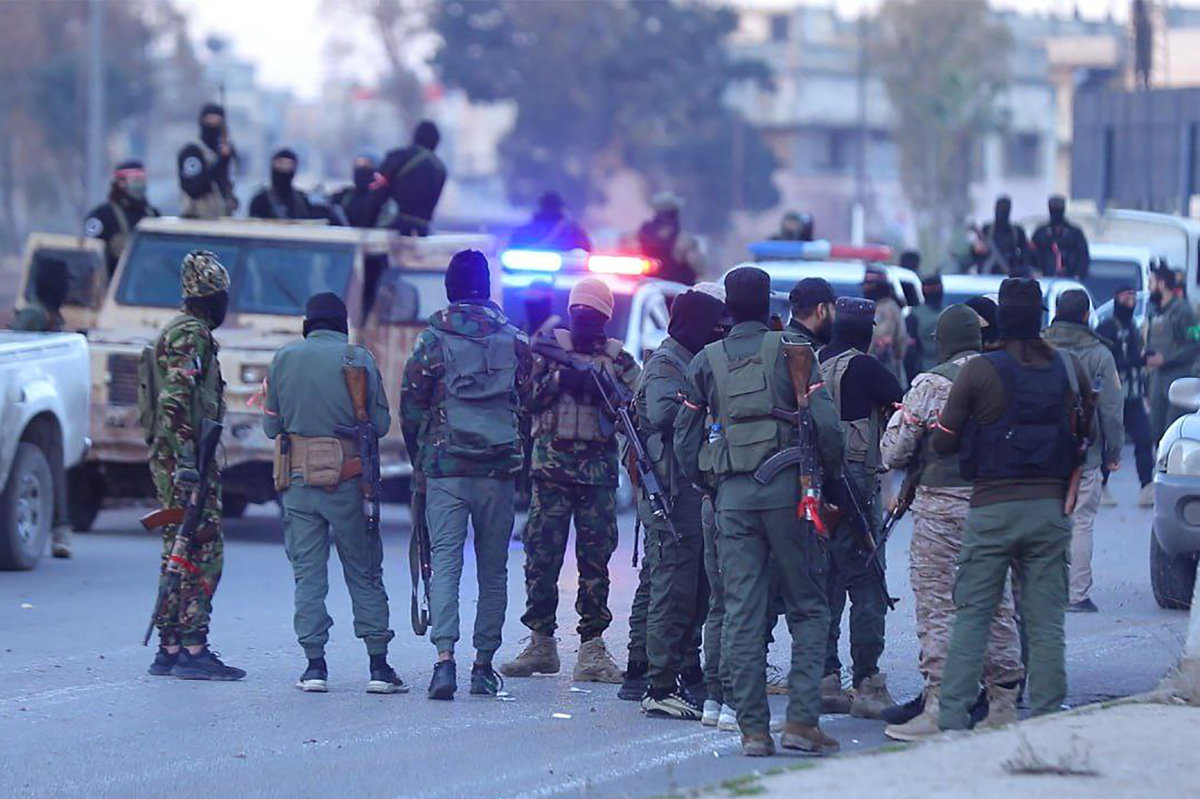
Fighters affiliated with Syria's new administration take part in an operation to track down members of ousted president Bashar Assad's paramilitary forces in the central city of Homs on January 2, 2025. (Photo by SANA / AFP)
The Syrian Observatory for Human Rights says the new authorities have arrested “dozens of members of local armed groups” who participated in the security operations in Homs.
Their arrest came after 35 people, mostly Assad-era officers, were summarily executed within 72 hours, according to the war monitor.
These groups “carried out reprisals and settled old scores with members of the Alawite minority … taking advantage of the state of chaos, the proliferation of arms and their ties to the new authorities,” it said.
In addition, the war monitor listed “mass arbitrary arrests, atrocious abuse, attacks against religious symbols, mutilations of corpses, summary and brutal executions targeting civilians” among the “unprecedented level of cruelty and violence.”
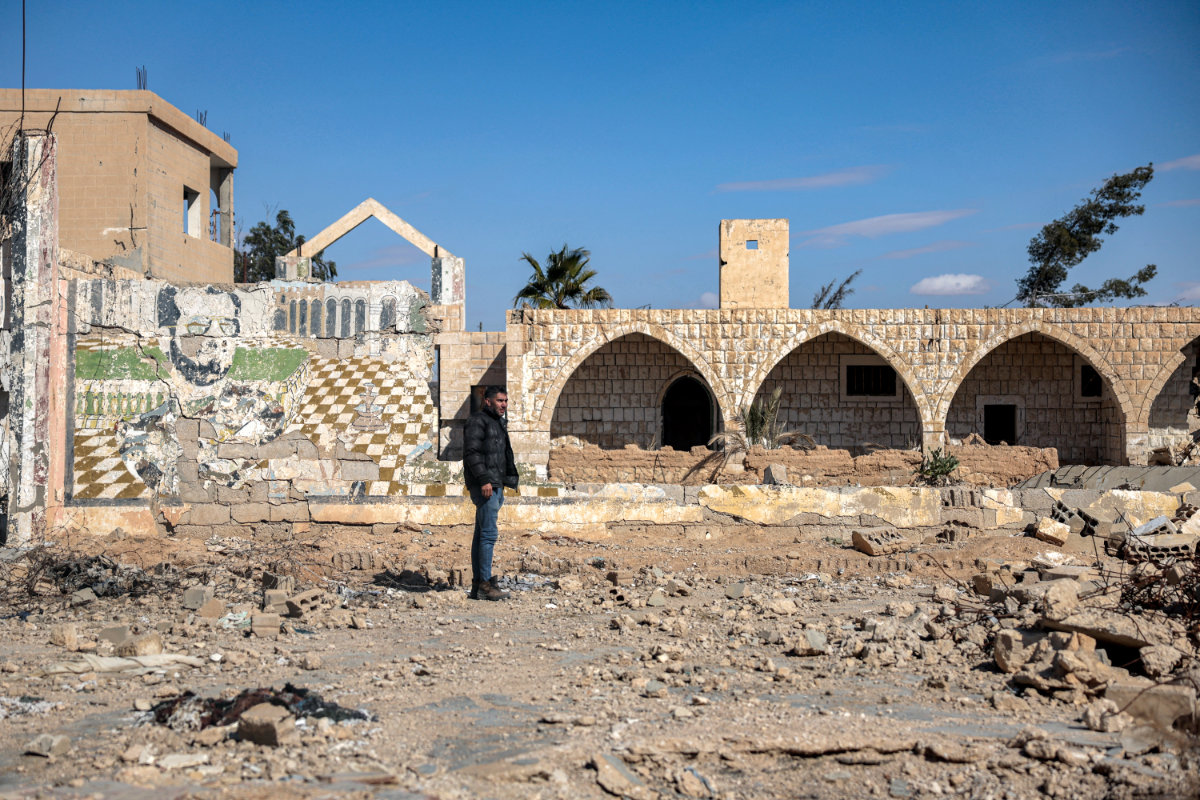
A local guides journalists visiting the ruins of the "French" Tadmor Prison, formerly used by the Assad government and destroyed by Daesh group militants in 2015, in Syria's central city of Palmyra on February 7, 2025. After the fall of the regime, members of Assad's Alawite sect are bearing the brunt of reprisals. (AFP)
These crimes demand an urgent transitional justice process to help prevent further bloodshed and division. However, unless the various armed groups are integrated into the Syrian Ministry of Defense, the security situation will likely continue to escalate.
“The new government must get control of the many militias that are not directly under government control,” said Landis. “They must also build their police forces so that they can bring some accountability to the countryside and stop crime.”
He added: “Even more important than a proper police force is a justice system that can provide the equality and accountability that President Al-Sharaa has been so eloquent in proclaiming will define the new Syria.”
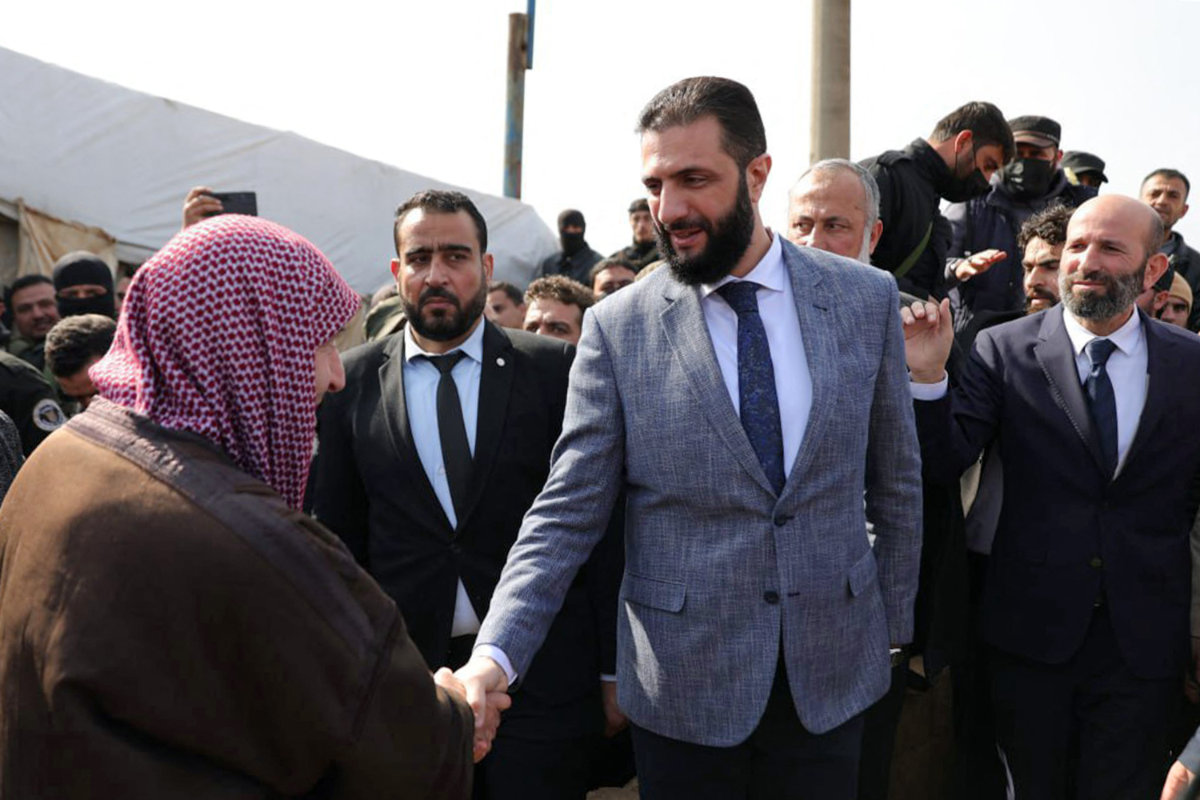
Syria's interim leader Ahmed al-Sharaa visits locals at a camp sheltering people displaced by the country's civil war in the northwestern city of Idlib on February 15, 2025. (Photo by Syrian Presidency Telegram Page / AFP)
On Jan. 30, in his first state address as president, Al-Sharaa vowed to “pursue the criminals who shed Syrian blood and committed massacres and crimes,” in addition to working to form an inclusive transitional government.
As Syria’s new leader “seeks historical recognition as the architect of a transformed and improved Syria,” he “must demonstrate his ability to curtail the influence of his armed militias,” said analyst Otrakji.
Al-Sharaa “recognizes that establishing and maintaining favorable relations with influential global powers and moderate Arab nations is crucial for achieving success,” he said.
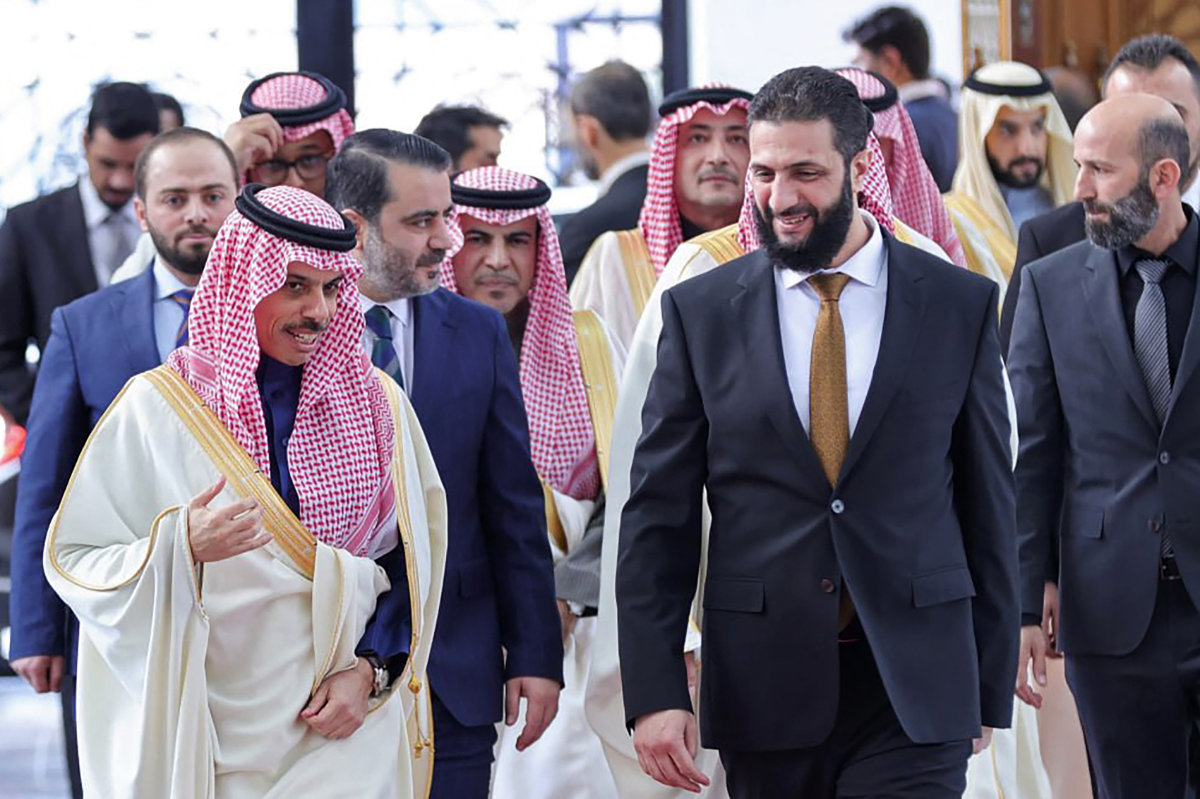
Syrian Arab Republic's new leader Ahmed al-Sharaa (center R) speaking with Saudi Arabia's Foreign Minister Faisal bin Farhan, before their meeting in Damascus on January 24, 20. (SANA photo via REUTERS)
“These nations have expressed their hope that Syria under his leadership will provide a secure environment for its minorities and uphold their rights as equal citizens.”
Al-Sharaa’s main challenge, however, “is that tens of thousands of armed men wielding significant power in the new Syria are not necessarily motivated by the same goals as their leader,” said Otrakji.
“Their objectives vary widely. Some are driven by a desire to purge Syria of ‘heretic’ sects. Others aim to impose strict moral codes, including regulating women’s attire. Some seek to seize the property — whether homes or mobile phones — of Alawite villagers, while others revel in the daily opportunity to humiliate them.”
The international community warns that peace and lasting security in post-Assad Syria requires the adoption of transitional justice, strengthening the rule of law, and holding free, fair elections to form a legitimate government.
“It’s not easy to have a genuine accountability process that is fair and inclusive, but that also ignores their own violations,” said Syrian analyst Shaar, referring to the new authorities.
“Someone might say: ‘It’s good we’re talking about this, but tell me about the disappeared in HTS areas, or about extrajudicial killings.’ If you open that door, where do you stop?”
Although transitional justice would be a very complex process, it is likely the only path to stabilizing Syria.
“Transitional justice seeks to help societies recover from widespread abuse and systematic repression, prioritizing victims and their interests while ensuring that perpetrators are held accountable through a fair and transparent process — without it becoming a tool for revenge or perpetuating new injustices,” Harout Ekmanian, a public international lawyer at Foley Hoag LLP in New York, told Arab News.
“Post-conflict Syria has a range of transitional justice mechanisms it can implement,” Ekmanian added, citing criminal trials, truth commissions, security sector reforms, reparations, and memorial initiatives for victims.
Implementing these mechanisms successfully “requires the active leadership of the state, working in close collaboration with the legal community, human rights organizations, and victims or their representatives,” he said.
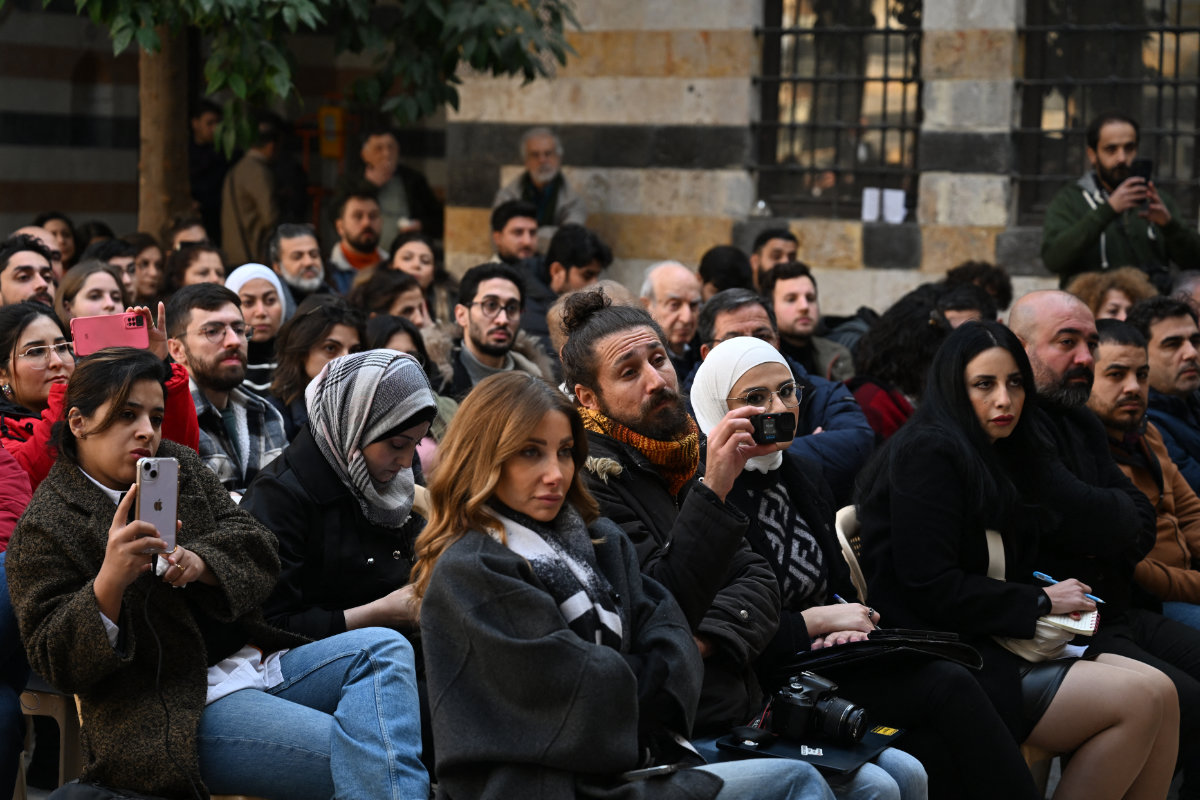
Representatives of Syrian civil society brainstorm in the courtyard of a traditional house in Old Damascus on January 6, 2025, on strategies to ensure their country does not return to authoritarianism. (AFP)
Ekmanian, who is originally from Aleppo, added: “Community awareness campaigns should accompany these efforts to educate the public on the concept of transitional justice and its role in fostering reconciliation and building a stable future.
“This would help manage public expectations. These campaigns should promote a discourse that encourages cooperation among all parties rather than fostering division or demonizing any group.”
The international community has called for the creation of a national transitional justice committee to document violations, offer psychological and social support to victims, and promote social reconciliation.
This committee could model the South African Truth and Reconciliation Commission, a proven conflict resolution model that followed the end of apartheid, to help Syria confront its past and build a future of justice and accountability.
Ekmanian said such commissions investigate past human rights violations and recommend pathways to justice.
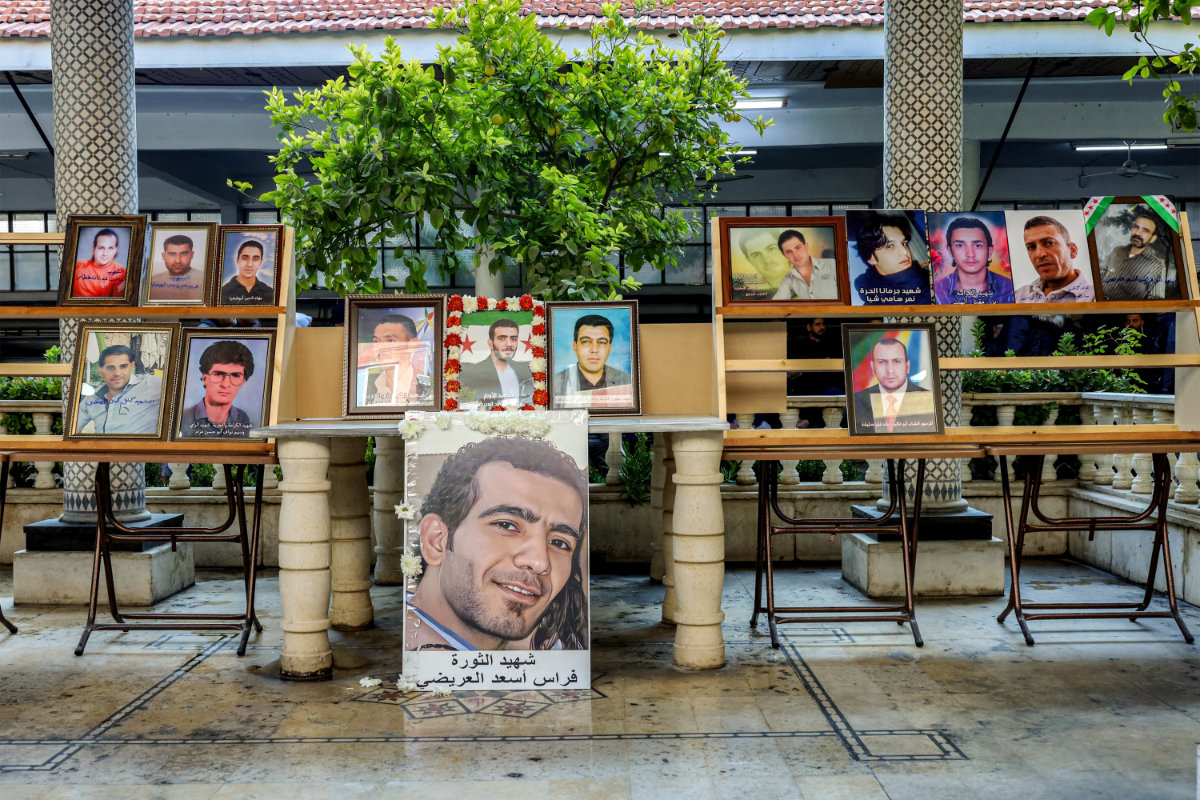
Pictures of 23 local Syrians who died in Saydnaya and other Assad-regime prisons are displayed during a memorial service for them in Jaramana in the Damascus countryside on the city's outskirts on December 21, 2024. (AFP)
“However, they go a step further by actively fostering reconciliation between victims and perpetrators,” he said. “They often incorporate restorative justice elements, such as public apologies, amnesty provisions, and dialogue processes, to help heal societal divisions.”
Truth and reconciliation commissions “could play a crucial role in gathering the narratives of victims and society, helping to establish the truth about a range of mass abuses,” including “the atrocities committed in Assad’s prisons, the torture, the sieges and indiscriminate bombings of civilian areas, chemical massacres, corruption, and last but not least, the fate of thousands of forcibly disappeared individuals.
“However, as with any transitional justice mechanism, the work of truth and reconciliation committees must be balanced with the need to maintain communal peace and stability,” he added.

The new government’s appointment of leaders from a single political, religious, and sectarian group has raised skepticism among Syrians about its ability to pursue an inclusive transition.
Moreover, a history of deep sectarian divides and vengeance across the region presents a significant challenge to a truth and reconciliation process.
Otrakji said: “Regrettably, the pervasive sentiment of revenge deeply ingrained in the collective psyche of the Middle East and the Mediterranean poses a significant challenge to the possibility of a South African-inspired truth and reconciliation process in healing the deep-seated wounds of Syria’s protracted history of conflict.”



